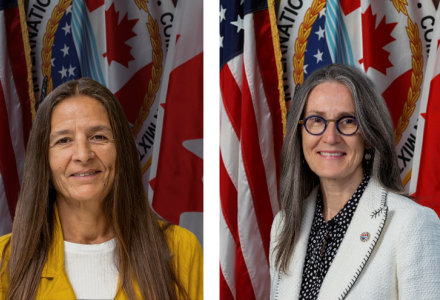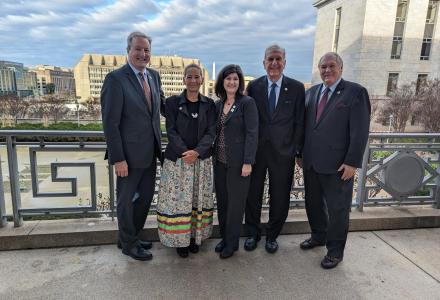
While the IJC’s International Watersheds Initiative (IWI) highlights the importance of considering watersheds as whole ecosystems that transcend boundaries, there are other principles central to the program.
Fundamental to the IWI is active and sustained engagement with local communities. By drawing on knowledge and connections from people who know and understand their watershed best, IJC boards can make informed and sustainable decisions.
There are several approaches that boards take to fulfill this aspect of IWI. This includes watershed boards designed to look at overall issues facing a watershed as well as boards with narrower responsibilities.
Several boards, including the International Rainy-Lake of the Woods Watershed Board, International Red River Watershed Board and International Osoyoos Lake Board of Control, have expanded membership to include people from Indigenous Nations and local communities. This gives local people a say in the board’s decision-making process and ensures that concerns or local and ecological knowledge are taken into consideration.
The IJC and its boards have taken steps in this direction for more than a decade. The Rainy-Lake of the Woods board established designated seats for Indigenous and non-governmental members of the public in 2013, and the International St. Croix River Watershed Board included a member of the public at its inception in 2007.
Beyond expanding board membership, people from local communities and Indigenous Nations have been able to participate in other ways. For example, the International Rainy-Lake of the Woods Watershed Board includes a Community Advisory Group made up entirely of people from surrounding communities and Indigenous Nations. They provide advice and insight to the board to consider when making decisions. Additionally, community involvement has been a vital component in several IWI-funded projects that IJC boards have undertaken in recent years.
In 2019, IJC Commissioners agreed to a list of priorities for the organization, including increased Indigenous engagement, which also became part of IWI priorities in the initiative’s most recent five-year plan.
This has taken shape in part through changes to board membership, but also in the development and design of IWI-funded board projects.
In the Red River basin, the board has been working with the White Earth Nation, the Rainy River First Nations as well as provincial, state and federal governments to study fish passage and ecosystem connectivity, using culturally important species such as lake sturgeon (and other vital species such as channel catfish and bigmouth buffalo) to assess how effectively fish can traverse the river’s watershed.
Indigenous knowledge and communities also were intimately involved in the 2022 Osoyoos Lake Water Science Forum in conjunction with the Osoyoos Indian Band and the Syilx Okanagan Nation Alliance.
The theme was “Bridging Indigenous and Western Approaches to Knowledge, Science and Management,” and the forum was a collaborative event between Indigenous experts and other knowledgeable people from governments, universities and local Western communities.
Similarly, the third State of the Basin report for the Rainy-Lake of the Woods basin, published in 2022, was co-authored and edited by Western science and Indigenous knowledge experts. It approaches challenges and concerns within the basin from both ways of knowing and reflects on issues important to local communities across the area. The Red River Watershed Board and International Lake Superior Board of Control also have IWI-funded efforts to specifically improve collaboration, engagement and involvement with local Indigenous nations.
Other IWI-funded collaborative projects include the St. Croix River fish passage study, developed alongside federal, state, provincial, local and Indigenous partners to look into the feasibility and options for improving fish passage along the river. This has led to a concerted effort to put into practice some recommendations from this report, with local groups raising funds to improve passage at Woodland Dam.

The Woodland Dam fishway was one subject of the St. Croix board’s fish passage study, developed in collaboration with Indigenous communities. Credit: IJC
In the Rainy-Lake of the Woods basin, the IWI has supported an aquatic invasive species risk assessment project undertaken with local, provincial, state and federal support to identify the most-pressing threats to the area, as well as another supporting bringing Project WET to local Minnesota schools, complementing an existing effort in Ontario to teach kids about their local ecosystem.
Another project in the Lake Ontario-St. Lawrence River watershed delved into ecological impacts of low water levels on Lake St. Lawrence, with the International Lake Ontario-St. Lawrence River Board partnering with state and federal agencies alongside local and Indigenous groups to perform the study and disseminate their findings.
These collaborative projects help better connect board work with communities in these watersheds. And local groups are frequently encouraged to develop new IWI projects with their board that can help fulfill board responsibilities and support local priorities.
The work of the IJC and its boards is best served by working with and alongside experts in transboundary watersheds. And through the IWI, bringing in local and Indigenous perspectives has resulted in a broader spectrum of knowledge and more thoughtful decision-making by water managers—an ideal approach for facing the challenges of the 21st century.

Kevin Bunch is a writer-communications specialist at the IJC’s US Section office in Washington, D.C.





